- Home
- Farley Mowat
And No Birds Sang Page 4
And No Birds Sang Read online
Page 4
“It’s the tip-off, Hill! Have that quid handy when I get back ’cause this is where you lose a bet!”
Two crowded weeks aboard a troopship bound for an assault landing, without knowing where or when it would take place, except that it would probably be somewhere with a warm climate, had turned us all into betting men. Corporal Hill had bet we’d land in Greece. Everyone else in the platoon had his own opinion, ranging from Istanbul to French West Africa. I had staked my money on Italy—not because I was prescient but because I had earlier overheard one of the divisional staff officers hinting that a knowledge of “Wop lingo” might not come amiss.
I threaded my way through the neat mounds of kitbags and packsacks occupying most of the deck space. As I reached the companionway Doc padded up to me. He wore his usual lopsided grin and was, as usual, unmilitarily familiar.
“While you’re with the nobs, boss, pick us up some fags from the officers’ canteen, will yuh?” I nodded. It was a losing battle trying to make Doc observe army etiquette. One day, I thought to myself, the colonel’s going to hear you talk that way to an officer and he’ll have your bloody scalp.
The lounge, which doubled as officers’ mess, was already crowded when I arrived. At the forward end a group of staff officers headed by a brigadier was clustered around a huge plaster relief map which had materialized overnight on top of the grand piano. The many small tables scattered about were clotted with officers of every rank and service. I elbowed past a group of British commandos, each sporting a long killing knife at his belt. Beyond them was a coterie of very correct, spiffily dressed officers from the ship’s military staff. A clutch of Desert Air Force pilots with silk scarves knotted under stubbled chins and “Thousand Hour Group” hats pushed nonchalantly to the backs of their heads lounged opposite a bunch of Navy sub-lieutenants looking very ill at ease in blue army-style battledress. There were even two flamboyantly attired American liaison officers. But all of these were as the plums and raisins in a pudding composed mainly of khaki-clad officers wearing the insignia of the infantry, artillery, tank, engineer, medical, signals, ordnance and service corps.
Bulking huge as a Titan in that assembly, Alex Campbell, together with Al Park and Paddy Ryan, Able Company’s two other platoon commanders, were holding a chair for me. As I crowded in beside them, Al, with a prodigious wink, slipped me a mug of rum and lemon under the table. Alex saw him do it and a frown settled on his heavy face, for he was a vehement temperance man.
The very pukka brigadier, who had been leaning over the plaster map, looked at his watch and held up a hand. The room became dead quiet.
“Now, gentlemen... hrrumph... you will treat what I have to tell you as Most Secret information... is that clear?”
He paused impressively while Al mumbled: “Pompous ass! Does he think there’s a Jerry spy with a wireless aboard this tub?”
“The action in which we shall soon be engaged is called Operation Husky. Details will be issued at the Orders Group for unit commanders which will follow immediately. In the meantime, it is my great pleasure to inform you that at dawn, July 10th, you will land on the southwestern tip of Sicily where you will join battle with the enemy in this first dagger-thrust into Fortress Europe.”
At the next table an artillery lieutenant slid his bunched fist in front of a companion and let fall a little pile of silver. Someone had guessed wrong.
The brigadier beamed on us like a grandfather who has just presented a long-sought gift to a group of children, then majestically he left the room. The bar reopened and, during the hubbub that followed, I was momentarily alone with my own thoughts. Sicily! I knew next to nothing of the place. Vaguely I recalled something about it being the home of the Mafia, and images of Al Capone and the Saint Valentine’s Day massacre came to mind. Then Alex’s great hand closed on my arm and squeezed until I winced.
“Not before time, eh, Squib?” he rumbled. “Not before time we sank our teeth into ’em!” There was a savage satisfaction in his voice that gave me pause. He’s like a grizzly, I thought: massive and formidable, but harmless enough unless you rouse his ire. I made a mental vow never to give him reason to round on me.
THE FOLLOWING DAYS were frenzied with activity. Orders-groups—O-groups, as they were called—proliferated like chain letters. Colonels were briefed by senior officers from Division, Corps and from Eighth Army, to which famous organization we discovered with a surge of pride we now belonged. The colonels held O-groups for their company commanders, who did the same for their subalterns and we, in turn, briefed our platoons.
Great bundles of pamphlets were broken out of the ship’s strongroom and showered upon us. They ranged wildly in subject, from Handy Italian Phrases to the order of battle of the German army in Russia. But this was all paper “bumpf” which could be, and mostly was, ignored. What chiefly concerned us was an issue of maps and air photographs of the Pachino Peninsula—the southeastern extremity of Sicily—containing 1st Canadian Division’s objective: the town of Pachino and its nearby airfield. We pored over these maps and photos with such avidity that images of them still remain imprinted on my mind.
We platoon officers and our senior non-commissioned officers spent hours studying the plaster relief map in the lounge, painstakingly trying to memorize every hill, hollow, track, hut and clump of olive trees on and inland from Sugar Beach, which was where we were to go ashore.
Throughout daylight hours Derbyshire’s decks were as crowded and busy as Waterloo station on Bank Holiday. The weather had grown uncomfortably warm and men sweated through physical training stripped to the waist. Platoons clustered around their officers and listened with unusual and flattering attention to lectures on everything from malaria to German mines. At night the ship murmured with movement as hundreds of men felt their way through blacked-out corridors to the upper decks, practising loading into the assault landing craft which would take them into battle.
Derbyshire was part of a fast convoy consisting of seven big troopers escorted by cruisers, destroyers and corvettes that had zigzagged its way across a thousand miles of ocean to avoid the lurking U-boats off the European coast. At least once a day the escort had hurled salvos of depth charges whose explosions thudded sickeningly against Derbyshire’s hull. One evening, just before reaching Gibraltar, they made a kill. Peering through binoculars from an Oerlikon gun platform, Park, Ryan and I watched mighty pillars of water rise against the setting sun like the bloody spoutings of titanic whales. When word was flashed by blinker lamp to tell us the sub was dead, we reacted like kids at a football game. Score one for us! I felt no fear of being torpedoed, had no scorching visions of violent explosions deep in Derbyshire’s hull, of flaming pools of oil upon dark waters and men struggling hopelessly therein.
As we entered the narrow throat of the Med we heard the nasal drone of aircraft engines and squinted into the white sky, almost hoping to see the minute midges resolve themselves into Heinkels or Messerschmitts. But the planes high overhead were ours; and through each succeeding day as we steamed into Mussolini’s Lake we were overflown by them. “God Bless!” we would greet them as they embossed their invisible patterns in the pale skies.
We passed blacked-out Gibraltar unseen in darkness; but as we stood on deck sniffing the hot land smells, we beheld an astounding spectacle—the Spanish city of Algeciras whose every light was burning as brightly as if the world were still at peace. The sight did not pleasure Alex who was standing near me. I heard him spit angrily over the rail, and grunt:
“Fascist swine! Somebody should put their lights out for good and all!”
By dawn we were well into the Mediterranean. To the south was the golden glimmer of the shores of Spanish Morocco, soon followed by those of Algeria where the Vichy French spun their collaborationist webs.
Hour by hour the tension mounted. All around us the sea and air were pulsing with gathering power as more and more convoys hove into view; new packs of grey destroyers foamed up to guard our flanks; and the planes pat
rolling overhead multiplied like shrilling locusts.
The convoy command ship became the centre of a maelstrom of activity as tenders and launches (all ships were observing strict radio silence and could communicate only by blinker lamp or messengers) scuttled around her like flotillas of water beetles.
One morning Paddy Ryan stuck his shock of red Irish hair into our tiny cabin and yelled at Park and me to come and “have a dekko.” We emerged into the hard sunlight to see the immense bulk of the monitor HMS Roberts passing to port. Unbelievably huge, she nevertheless sat so low in the water she was nearly submerged—except for her fighting top and gigantic turrets, each of which tilted its brace of 16-inch guns ominously toward the northern horizon. Her accompanying cruisers and destroyers looked fierce and dangerous enough, but Roberts had an aura of brutal power about her that made even the usually unimpressionable Al Park whistle:
“Cor blimey! Wot price yer ’appy ’ome when that big barstard pulls the plug! Wouldn’t give two farts in a windstorm for the Jerries on the receiving end!”
The Power and the Glory! It looked as if we would have both upon our side when D-day dawned.
ON JULY 8 I was company orderly officer, and so had to accompany the party of senior officers which daily sniffed its way around the vessel to ensure that everything was properly shipshape. The troops were all up on deck exercising or listening to lectures. As far as I could tell, Able Company’s portion of Troopdeck B was in good order; packs neatly stacked, blankets and hammocks rolled, and deal tables scrubbed. Then the staff colonel in charge of the inspection halted abruptly. With his swagger stick he indicated an empty cigarette package lying half-hidden behind a crate of bombs.
“Good God! What’s that?” he demanded angrily.
I mumbled an apology and got a withering glance in return.
“Disgusting! See to it at once!”
“Seeing to it” meant routing out the duty orderly who on that day was Private Tiny Sully of my platoon. I could not find him until I tried the heads, which were located directly over the thundering propeller shafts. Peering around in the dim light, gagging on the pervasive latrine stench, I finally spotted Tiny in the farthest corner from the door. For a moment I thought either he or I had gone quite mad.
He was standing at attention with eyes screwed shut, methodically sloping arms and then presenting his rifle for inspection to... nobody. My back hairs prickled as I watched him release the safety catch... pause... slide back the bolt... pause... shove his thumb into the chamber... pause... thrust the barrel forward... pause... then, robot-like, go through the whole procedure in reverse.
The smallest man in the platoon—he was an inch or two shorter than me—Tiny had spent the first sixteen years of his life in an orphanage and had lied his way into the army at seventeen. Although a little withdrawn he had seemed normal enough, but now something had gone badly wrong. His face was the colour of ashes, and rivulets of sweat seemed to be pouring down his cheeks and dribbling off his chin. I took a step or two toward him and was horrified to discover that the sweat was tears—that Sully was weeping uncontrollably.
Having no idea how to handle this situation, I hurried on deck in search of Company Sergeant-Major Nuttley, a slim, dark man in his early thirties who had come to my aid several times since I joined the company. I took him aside and described what I had seen.
“Blue funk, sir, that’s all,” he told me cheerfully. “Not to worry. I’ll soon snap him out of it.”
Briskly he turned on his heel but he left me shaken and uneasy. I had never seen anyone give way to fear before, and I could not comprehend how Sully could become like that even before the guns began to fire. My God, I thought, if it can happen to him... A jagged sliver of self-doubt slipped between my ribs.
When the bar opened at 1700 hours I was more than ready for it. I joined Paddy Ryan, and we sat together by a big window in leather easy chairs once occupied by first-class passengers, while I drank rum and lemon with determination, trying to put the image of Tiny Sully out of mind.
Paddy was a big, raw-boned maverick whose favourite phrase was “It’s a bloody balls-up!” and whose favourite occupation seemed to be puncturing the pomposity of those whom it had pleased the Lord to set in authority over us. On our second day at sea he had won great kudos among us junior officers by posting a cartoon on the orders board at the entrance to the lounge. It showed the rear view of an enormous bull elephant with a tiny mouse looking up in awe at the well-hung giant and saying: “How true it is! The higher the formation, the bigger the balls!”
The cartoon was rudely removed moments after the British brigadier who was senior military officer aboard ship caught sight of it, and Paddy had been meditating revenge ever since.
We were on our third or fourth round when the brigadier himself made an entry, accompanied by a covey of staff officers. Paddy at once began to growl like an irate bulldog. “Nattering bastards! No respect for art!” Abruptly he emptied his glass and shoved the table back. “C’mon, Squib! Duty calls!”
Slightly befuddled I followed as he purposefully led the way out of the lounge and down to C Deck where the engineers had stored their assault equipment. Still growling, he unearthed a mine detector, strapped the haversack containing the battery and amplifier on my shoulders, clamped the headphones over my ears, and thrust the mop-like detector unit into my hands. This done, he produced a flask of Navy rum, uncorked it and made me take a shocking big swallow. He had one himself while I struggled to get my breath back.
By now I was both befuddled and bewildered.
“What the hell goes on? Mine detector’s no friggin’ good on a steel boat, is it? Whatsa game?”
“Yours not to question why!” Paddy thrust the bottle at me again. “Up the Irish ivvery toime!”
The lounge was full by the time we returned to it for this was the last night before the dawn of action. The motley crowd was doing its best to drink the bar dry and at first nobody even noticed my odd appearance as we sidled into the room.
I held the detector head in front of me while Paddy walked close behind, his fingers on the volume control of the haversack amplifier.
“Those drinks are ruddy time bombs!” he whispered fiercely in my ear. “Sniff ’em out!”
Obediently I swung the detector over a table crowded with glasses, while Paddy turned up the volume. The resultant high-pitched screeching in the earphones nearly deafened me and was clearly audible to the startled owners of the drinks. Paddy’s long arms swept down upon the table and snatched up two glasses—one for each of us.
“Mine lifting detail, gents! Sorry, but these things is lethal.”
Standing by the bar the brigadier watched our progress from table to table with what was clearly a jaundiced eye. But although his bushy moustache twitched with irritation, he was not about to demean himself by taking overt notice of our antics. As we worked our way closer to him he deliberately turned his back and began talking to a red-tabbed major of his staff. All eyes were on us now and the hubbub was dying away as Paddy muttered a peremptory order: “Check his bum!”
Obediently I raised the detector head and, as it came level with those well-pressed serge trousers, Paddy turned the amplifier up as far as it would go.
The subsequent squeal could be heard all over the now utterly silent room. The brigadier twitched convulsively, but he was made of solid stuff. He did not turn... not, that is, until Paddy leaned over me, tapped him on the shoulder and proclaimed in a concerned and ringing voice:
“Begging your pardon, sir. Looks like you got a booby trap shoved up your ass!”
In the pandemonium that followed I vaguely remember being held up on my feet by a magenta-faced Alex Campbell while Lieutenant Colonel George Renison, the senior Canadian aboard ship, addressed himself to me.
“You lucky little twerp! You’ll never know how close to a court martial you two’ve just come! If it hadn’t been that we’ll be in action in thirty-six hours...” He turned his head away, unab
le to contain his laughter.
It was a great evening. One to cherish in the days ahead.
WHEN I BLEARILY opened my eyes next morning it was to discover we were under attack—not by any human antagonist but by the sirocco. Born in the furnace of the Sahara, this baleful wind had come roaring northward over the Mediterranean in the early hours before dawn, seemingly intent on scattering the vast flotilla of big and little ships which was even then turning north toward Sicily.
Derbyshire was wallowing like a drunken sow. All the loose gear in our cabin had been pitched to the floor where it slithered and clattered back and forth as the ship lurched and rolled. For the first time since we had been together, Doc was not on hand to get me started on my day. When I struggled down into the noisome fug of the troop decks, I understood the reason for his absence. Troopdeck B was a shambles. Many of the men still swung in their hammocks, green and groaning and unable or unwilling even to sit up. The smell of puke and engine oil was overwhelming. Everything that was not lashed down had come adrift: kitbags, weapons boxes, steel crates of ammunition, mess tins, tin helmets and nameless flotsam surged back and forth among the upturned tables, banging into stanchions and fetching up at the end of each long roll in dishevelled heaps against the bulkheads. The din was deafening but by virtue of screaming myself hoarse I managed to get most of the seasick men headed up the companionway to the main deck where they would at least be able to breathe.
Platoon Sergeant Bates and a few others, who, like me, were relatively immune to seasickness, pitched in to try and bring some order out of chaos. It was exciting work. A box of Mills grenades had broken open and the deadly little bombs were hurtling back and forth like so many hard-pitched baseballs. Bates was hit in the back of the legs by a charging crate of ammo and sent slithering down the canted, greasy deck. As I helped him to his feet his temper flared:
“Fuckingsonofawhore! Worse than a goddamn rodeo!”

 Owls in the Family
Owls in the Family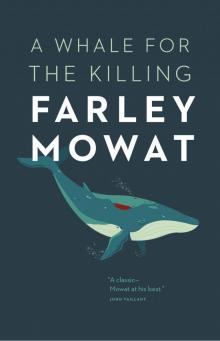 A Whale for the Killing
A Whale for the Killing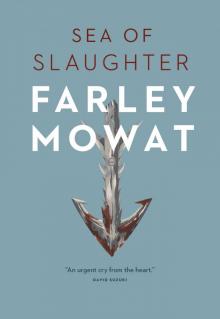 Sea of Slaughter
Sea of Slaughter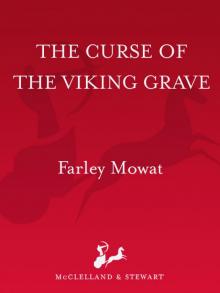 The Curse of the Viking Grave
The Curse of the Viking Grave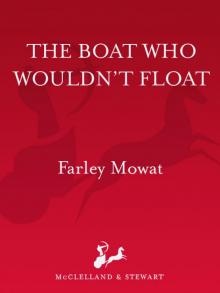 The Boat Who Wouldn't Float
The Boat Who Wouldn't Float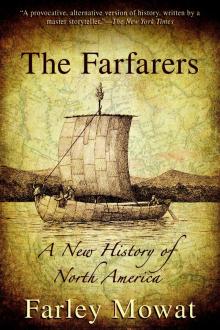 The Farfarers: Before the Norse
The Farfarers: Before the Norse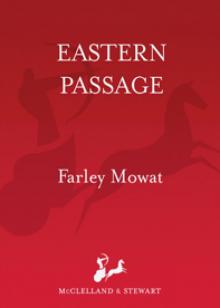 Memoir
Memoir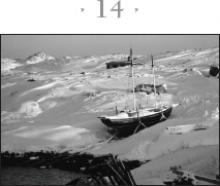 Bay of Spirits: A Love Story
Bay of Spirits: A Love Story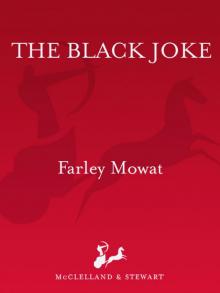 The Black Joke
The Black Joke Sibir: My Discovery of Siberia
Sibir: My Discovery of Siberia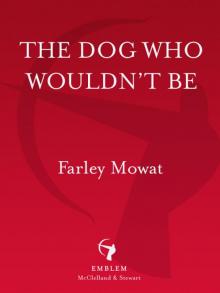 The Dog Who Wouldn't Be
The Dog Who Wouldn't Be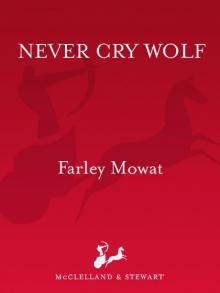 Never Cry Wolf
Never Cry Wolf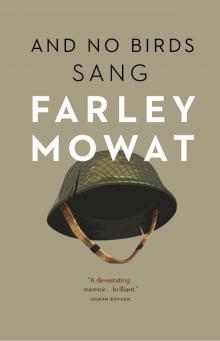 And No Birds Sang
And No Birds Sang The Snow Walker
The Snow Walker Born Naked: The Early Adventures of the Author of Never Cry Wolf
Born Naked: The Early Adventures of the Author of Never Cry Wolf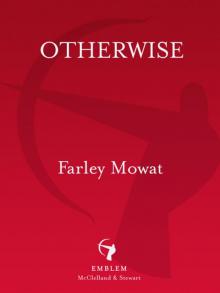 Otherwise
Otherwise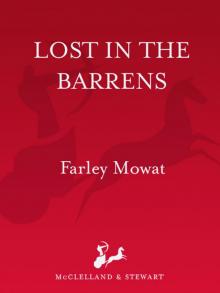 Lost in the Barrens
Lost in the Barrens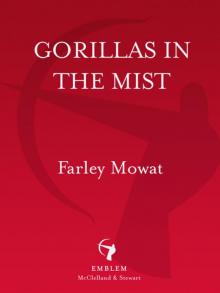 Gorillas in the Mist
Gorillas in the Mist People of the Deer
People of the Deer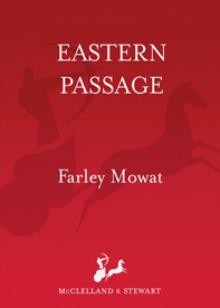 Eastern Passage
Eastern Passage Sibir
Sibir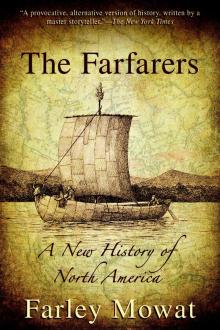 The Farfarers
The Farfarers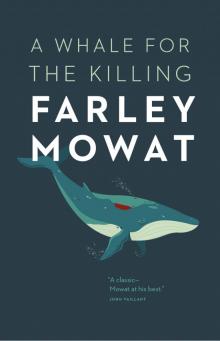 A Whale For The Killing (v5.0)
A Whale For The Killing (v5.0)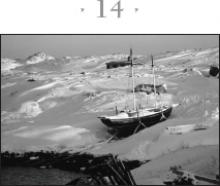 Bay of Spirits
Bay of Spirits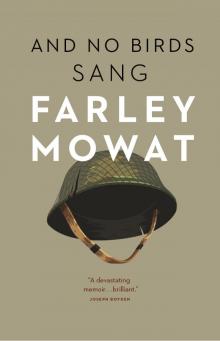 And No Birds Sang (v5.0)
And No Birds Sang (v5.0) Born Naked
Born Naked